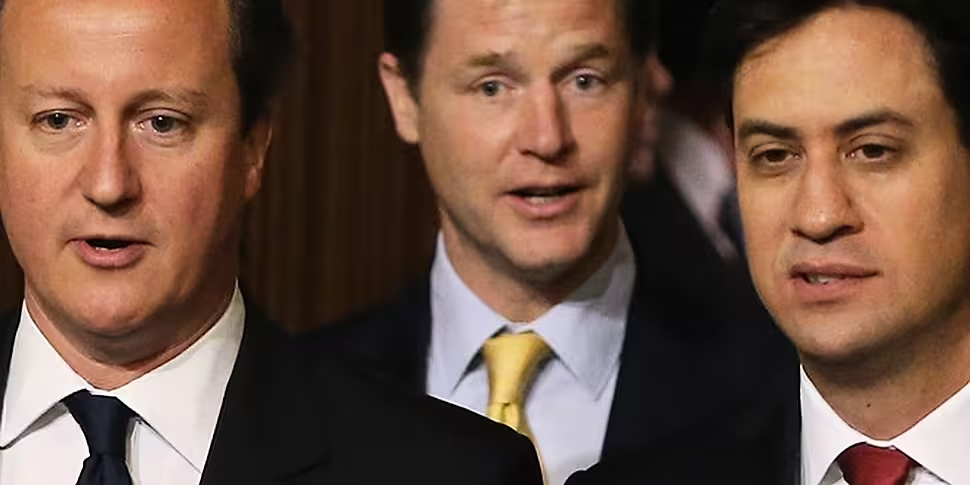It's simple maths.
Either one party or a combination of parties needs to put together enough seats to make a majority government so they can command the confidence of the House of Commons (get stuff done).
There are 650 seats in the House of Commons but because the Speaker doesn't count and Sinn Fein MPs don't take their seats, the magic number for a majority is around 323 - rather than 326.
In 2010 Conservatives (307) + Lib Dems (57) = coalition (364).
This time, projections indicate it may not be quite so simple.
Even if parties settle for a minority government, 323 MPs still need to support its programme for the next five years which will be set out in the Queen's Speech on 27 May.
Here are the deals that could be on the table in the battle for power.
- Labour/SNP
Probably the best chance of a two-party deal. Projections made for Sky News based on polling have consistently suggested the combination of Ed Miliband and Nicola Sturgeon's parties could hit the magic 323 for a majority government.
But Mr Miliband ruled out "deals or coalitions" with the SNP during the leaders' Question Time session, saying there would be no Labour government if that's what it took.
He has left himself little wriggle room come 8 May - is it at all possible for him to negotiate vote-by-vote support or some other kind of agreement without being accused of breaking promises?
- Labour/Lib Dem
Likely a better fit than in 2010 and Nick Clegg has offered to be the "brains" of a Labour deal - the "heart" of a Tory one (follow the yellow brick road and all). He has also said he thinks of Ed Balls when he is kickboxing so it's very much mixed messages.
Given the Lib Dems are expected to see the number of seats they hold halved it is unlikely Mr Clegg could even put Mr Miliband in Number 10 without extra help.
- Labour/SNP/Lib Dems
In the event Labour and the SNP need topping up then they may appeal to Nick Clegg's party to make up the numbers.
It's unlikely though. The Lib Dem leader has made it plain he will not consider working with a party whose prime aim is to break up the Union.
- Labour/SNP/Green/Plaid Cymru/DUP
It has been abundantly clear from the televised debates that Nicola Sturgeon, Plaid's Leanne Wood and the Greens' Natalie Bennett have been talking. Ms Sturgeon said as much.
Her offer to put Mr Miliband in Number 10 included the backing of the Greens and Plaid.
- Tory/SNP
Absolutely no way. Not. Going. To. Happen. Ruled out by everyone.
- Tory/Lib Dem
What might have seemed a relatively safe bet six weeks ago, now seems less and less likely. Senior Lib Dems have been making noises suggesting Mr Clegg would have a very difficult job persuading the party to get back into bed with David Cameron's party.
In the dying days of coalition even Mr Clegg started talking about the Tory "headbangers" taking over the show. The differences between the two parties are greater than in 2010. There are the not inconsiderable stumbling blocks of an EU referendum, scrapping the Human Rights Act and welfare cuts for a start.
It would be unwise to put any money on a formal coalition/Rose Garden love-in this time. In any event, Mr Clegg's party is unlikely to win enough seats to put a Tory/Lib Dem coalition within touching distance of the magic 323.
Any minority coalition would be very unstable indeed.
- Tory/Lib Dem/DUP/UKIP
There's still a feeling the Conservatives are likely to win a far greater number of seats than the projections have been forecasting. Even so they are going to struggle to get enough support together to form a majority.
With a significantly weakened Lib Dems it could leave Mr Cameron casting around. The Right-leaning DUP has said it will support either the Tories or Labour - it will, of course, want something in return.
A four-way deal would be a messy series of agreements, vote-by-vote deals and horse trading. It would be a hard centre to hold.
A three-way deal here would be more likely mainly because Mr Clegg refused to be any part of a deal including Nigel Farage.
- Tory/UKIP
The Tories have ruled it out. Mr Farage has said he's happy to talk but will want that EU referendum, pronto.
The maths is unlikely to add up here unless the Tories emerge triumphant from significantly more constituency contests than has been forecast in even the most optimistic projections (from their point of view). UKIP is expected to manage no more than a small handful of seats at the most.
- Tory/Labour
A grand coalition. It's not so mad as all that. If no government can be formed and the markets start to tank then desperate times may indeed call for desperate measures.
Labour stalwart Charles Clarke, who was in Tony Blair's Cabinet, has said the prospect is not "unthinkable" and the Tories' Lord Baker has said Mr Miliband and Mr Cameron should unite to see off the threat of the SNP.
A small number of Labour and Conservative MPs have suggested it would not be such a bad idea.









